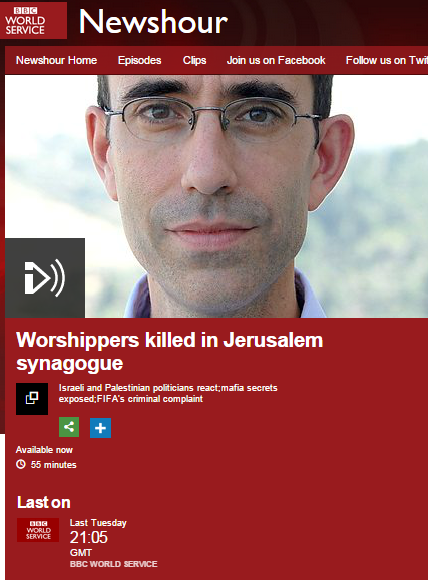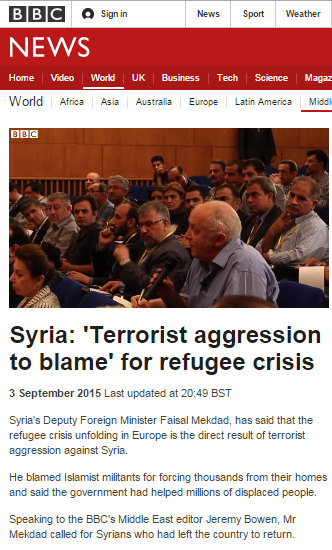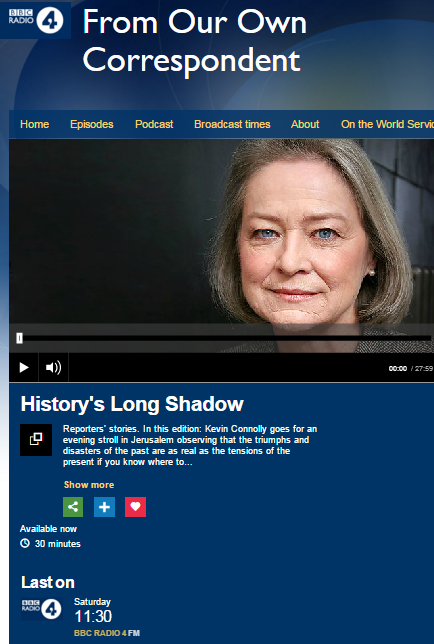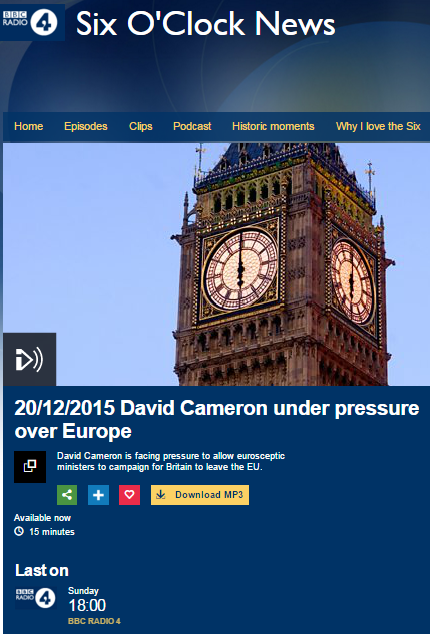On December 11th viewers of BBC television news were shown a filmed report by Yolande Knell about the funeral of Ziad Abu Ein which was also promoted on the BBC News website under the title “Thousands attend funeral for Zaid Abu Ein amid tensions“.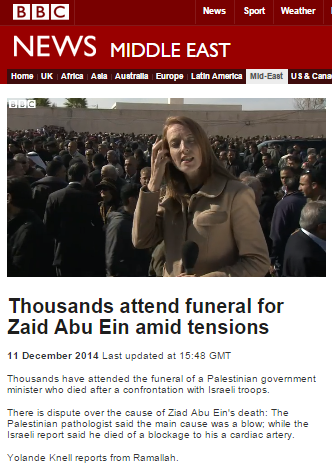
By the time that report was broadcast well over 24 hours had passed since Abu Ein’s death, during which not only had filmed material from a number of sources come to light, but an autopsy had been carried out. One may therefore have expected that Knell’s report would be free of the many inaccuracies which marred Kevin Connolly’s filmed report from the previous day. That, however, was not the case.
Like Connolly, Knell does not adequately inform audiences of the circumstances of the demonstration attended by Abu Ein, saying:
“A day ago, dozens of protesters gathered to plant olive trees by a Palestinian village. This was meant to be a symbolic show that the land, near a Jewish settlement, is rightly theirs.”
As was noted here in connection with Connolly’s very similar representation of the subject:
“In fact, the protesters – who were organized by the councils of adjacent villages – arrived at the specific location at the particular juncture because on that day the political NGO Yesh Din, together with the same local councils, presented a petition to the Supreme Court demanding the eviction of the nearby outpost Adei Ad – as stated by the organisation’s lawyer Shlomi Zacharia in the interview here (Hebrew, from 7:24).”
Like Connolly, Knell also misrepresents the sequence of events, telling viewers that:
“…Israel’s security forces were waiting for them and Mr Abu Ein was caught up in angry scenes. At one point an Israeli border policeman briefly grabbed his throat. He fell to the ground.”
The fact that (as can be seen in filmed footage of the incident) Abu Ein engaged in physical and verbal provocation of the security forces goes unmentioned in Knell’s account of events. Likewise, she inaccurately tells audiences that Abu Ein “fell to the ground” when he actually sat down of his own accord and implies that happened immediately after the altercation with the Border Police officer, whilst in fact Abu Ein managed to give an interview to the media between the two events. Knell also fails to mention that an Israeli paramedic tried to treat Abu Ein, but that he was instead quickly evacuated by a Palestinian ambulance and died on the way to hospital.
Knell misrepresents the results of the autopsy, presenting the fact that Abu Ein was already suffering from ischemic heart disease as an Israeli claim only. She both amplifies Palestinian conspiracy theories herself and provides an unchallenged platform for Saeb Erekat to further embroider the tale.
Knell: “Israel says he died of a heart attack and had a pre-existing condition. But after a post-mortem exam, Palestinians say he was killed in cold blood.”
Erekat: “Of course, ya’ani, he could have been killed by his…eh…an explosion his main artery but what caused this? What caused this was Israeli soldiers suffocating and beating up Ziad Abu Ein. They are fully responsible. The Israeli government is held fully responsible in accordance with the autopsy report.”
There is of course no evidence to show that Abu Ein was either ‘suffocated’ or ‘beaten up’ but nevertheless Knell fails to communicate that fact to viewers.
This is of course far from the first time that we have seen the BBC not only failing to provide audiences with the necessary information which will help them to distinguish between reality and the chaff of rumour, hearsay and propaganda but also amplifying the latter on an equal footing with established facts. Just last month when an autopsy determined that a Palestinian bus driver had committed suicide, the BBC saw fit to promote unproven claims that he had been murdered in no fewer than seven reports on numerous platforms.
Licence fee payers are no doubt wondering what is the point of funding a news organization which cannot – or will not – distinguish between blatant political propaganda and reality and thus repeatedly fails to help its audiences understand the facts behind events.

